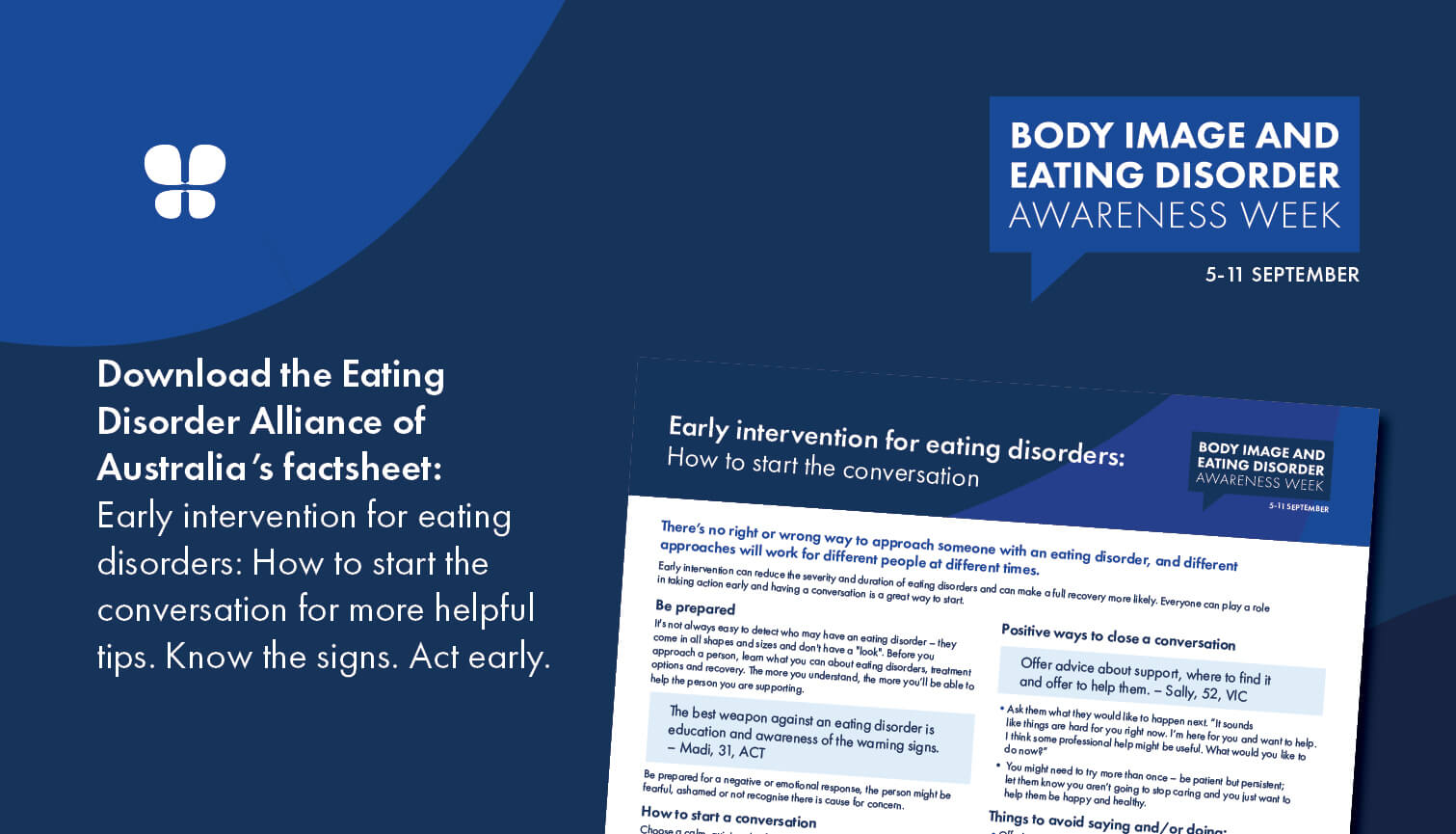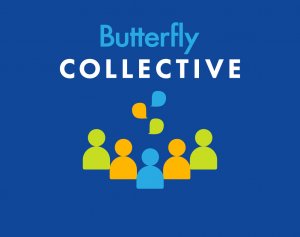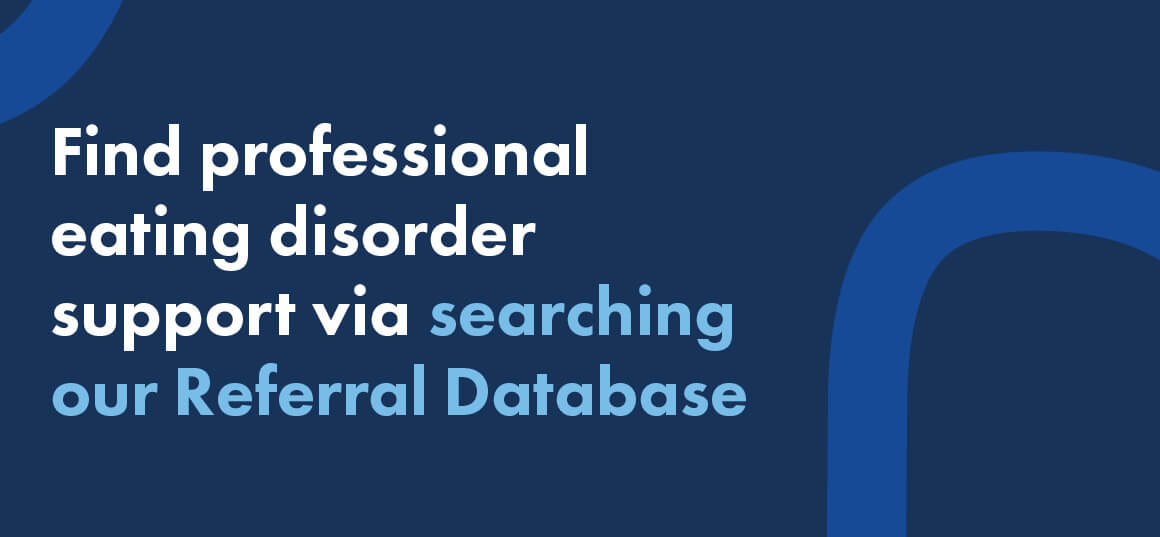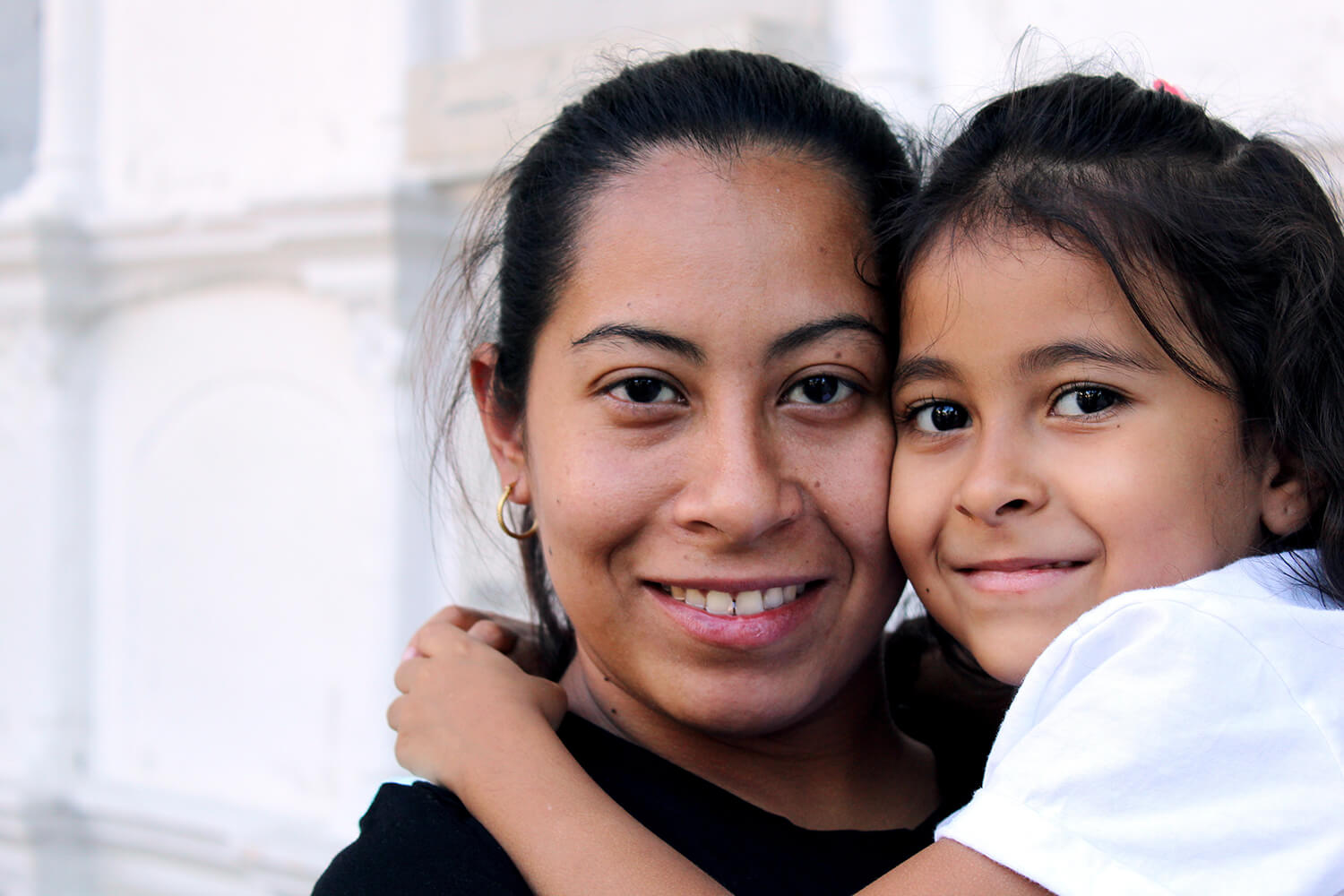How can early intervention help eating disorder recovery?
The 2022 theme for Body Image and Eating Disorders Awareness week is ‘Know the signs, and act early’. We asked our lived experience network, the Butterfly Collective, how early intervention could have stopped their eating disorders from developing and thriving, and how it could make recovery more possible.
Research demonstrates that on average, recovery from eating disorders takes between one to six years, while up to 25% of people will experience a severe and long-term illness. With early detection and intervention, prospects of recovery are increased and high.
But intervening early and seeking help isn’t always easy. Common barriers to early intervention for eating disorders include:
- Lack of awareness and education among healthcare providers and carers as to the warning signs and early symptoms of eating disorders
- Lack of funding for early intervention treatment services
- The individual facing ambivalence to recovery and unable to realise there is an issue or be wanting to change
- Disordered eating and exercise behaviours and attitudes normalised and praised in society, usually promoted by diet culture.
- Stigma and shame – particularly for males – that eating disorders are a feminine condition or act of vanity.
- Low mental health literacy
- Eating disorder stereotypes that suggest you need to look a certain way or be “sick enough” to receive treatment or support.
Butterfly’s lived experience community, The Butterfly Collective, have provided their insights into how to make early intervention more likely and improve recovery outcomes.
Recognise disordered eating – when it starts
One third of people believe disordered eating behaviours are ‘pretty normal’. But disordered eating is one of the greatest risk factors in developing an eating disorder.
“Eating disorders are scary and isolating, and nobody deserves to struggle on their own any longer than they already have. By identifying and supporting people that are at risk for, or showing early systems of body image concerns and/or disordered eating, we could prevent the development of an eating disorder, and change the course of someone’s life.
For me, by the time I was in treatment, my eating disorder had become so ingrained that I couldn’t even understand what I was doing was wrong. If I had received support earlier, when I started becoming concerned with my body image and preoccupied with what I ate, perhaps I wouldn’t have gone on to develop the anorexia that consumed 10 years of my life.” – Jemma, 24, QLD
“The early stages of eating disorders fly under the radar so easily that it’s almost impossible to notice unless you’re informed, and it doesn’t help that many disordered eating behaviours are ingrained in society and diet culture. When I reflect on my life, I can see many disordered eating behaviours that definitely could have been managed before they progressed to a formal eating disorder diagnosis. I also think there’s a lot of work to be done in unpacking these seemingly harmless behaviours as “normal” and encouraging healthy/neutral attitudes towards food exercise and body image.” – Georgia, 27, VIC
Early intervention can make recovery easier
While early intervention depends on early detection of symptoms, research shows there is currently on average a delay of approximately four years between the start of disordered eating symptoms and first treatment, reaching at times 10 or more years. It’s imperative to know the signs, and act early, before the eating disorder thoughts and behaviours become entrenched.
“The longer disordered behaviours and negative thought patterns exist for an individual, the harder they are to break. They become a safety net and a maladaptive way of coping, so the fear of letting them go increases, making recovery incredibly long, difficult, and expensive”. –Grace, 25, VIC
“Early intervention is important in helping to break thought patterns and behaviours that become so ingrained over time. I am now in recovery but have been living with my ED for over 20 years. Had I received some early intervention these long-held patterns and beliefs may have been easier to accept and change.” –Sally, 52, VIC
“Eating disorders are best treated as early as possible in order to promote a full recovery as the warning signs and symptoms generally do not go away on their own. I understand it can be incredibly daunting to approach someone whom you suspect is struggling, however, it is very important, as usually a person with an ED will try and conceal their behaviour for as long as possible to avoid detection or not know how to ask for help. The longer someone lives with an eating disorder, the more physical and psychological damage will be done, and the longer it will take to reach a point of full recovery. Early intervention for me, I believe, may have given me a better chance at completing high school.” – Jordan, 30 , NSW
“Early intervention helps to prevent eating disorder thoughts and associated feelings becoming stronger, or taking a stronger hold over a person. Learning about why the eating disorder is there, and the lies it is telling someone early on, can help life to stay in control of their hands.” – Alex, QLD
Any weight is deserving of help
One in four Australians believe people with symptoms of eating disorders would only need to seek professional help if they became dangerously underweight. This is a significant misconception that prevents people from seeking the help they deserve.
Eating disorders come in all shapes and sizes – and are serious no matter what the individual’s BMI is.
“Eating disorders present in different ways. They are far-reaching and indiscriminate to communities and so it can be mindful to note that many people who have eating disorders may not have the visual representation of what the general public believes represents an eating disorder.” – Jordan, 30, NSW
“Eating disorders and body image concerns are so insidious. Mine festered and stewed, convincing me that this was going to be the rest of my life. I don’t think anyone ever feels that they are sick enough to seek help. Early intervention is so key to disrupting the thought and behavioural patterns before they become strong, established neural pathways. I think I would’ve been more open to receiving help and doing the hard work it takes to recover.” – Jeanette, 23, VIC
How to approach someone you’re concerned about
It’s normal to feel scared, confused, frustrated or upset when someone you know is experiencing an eating disorder. But intervening early can have a stark difference on an eating disorder’s severity and duration.
If you’re not sure where to start, download the Eating Disorder Alliance’s factsheet, Early Intervention for Eating Disorders: Conversation Starters.

Get support
It’s never advised to ‘watch and wait’. If you, or someone you know, is concerned about their relationship to food, exercise or their body, or is experiencing an eating disorder or body image concern, reach out to Butterfly’s National Helpline on 1800 ED HOPE (1800 33 4673), chat online or email support@butterfly.org.au
Confidential and free support from our trained eating disorder counsellors is available 7 days, 8am-midnight (AEST).
The first step to recovery from an eating disorder or body image issue is often seeing a health professional, such as your GP. Butterfly’s Referral Database can help you search for health professionals who are qualified in treating and support eating disorders.
Join the Butterfly Collective
 If you have lived experience of an eating disorder or body image concern, or care for someone who does, we want to hear from you!
If you have lived experience of an eating disorder or body image concern, or care for someone who does, we want to hear from you!
Lived experience of eating disorders and body image concerns lies at the heart of Butterfly’s work as it connects us to our origins and the communities we serve. By drawing upon lived experience wisdom and embedding it across all our work, we can ensure that our advocacy work, programs, projects, and services represent the diverse nature of our community and their needs.
The Butterfly Collective is an online community of people across Australia who either have a lived experience of an eating disorder or body image concerns, or are a carer, family member or friend of someone with a personal experience. This community is designed to help Butterfly to amplify the voice of people with a lived experience by inviting its members to take part in activities which will help to shape our work.




















